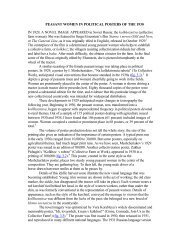CHAPTER 3: DIGNITY AND RESPECTU.C. <strong>Berkeley</strong> says it values its workers and regards them as its greatest resource, but theuniversity’s actions speak louder than its words. Although many workers have built supportivecommunities with their colleagues, and some individual supervisors are liked a great deal,workers we talked with feel unappreciated by the university and report a barrage <strong>of</strong> daily indignitiesin their encounters with authorities. We were surprised to find that seemingly “minor” indignitiescaused workers as much anguish as did the “major” injuries <strong>of</strong> insufficient incomes andunhealthy working conditions. They are as outraged by the intangible insults <strong>of</strong> such everydayindignities as they are by the concrete economic and physical injuries they suffer.Why is this the case? Workers’ sensitivity to everyday insults is symptomatic <strong>of</strong> their deeperand more pr<strong>of</strong>ound disappointment and loss <strong>of</strong> trust in their employer. Typically, people startwork at the university assuming that a public institution dedicated to higher education would alsotreat its workers as members <strong>of</strong> a community. Yet sooner or later, each one <strong>of</strong> them experiencesan event, a “crucial test,” which tells them that they are simply cogs in a money-makingmachine rather than human beings who are valued members <strong>of</strong> a community that comes togetherto serve a higher educational purpose. During such crucial tests, workers find their health, wellbeing,comfort, knowledge, or security compromised simply because the university is trying tosave time and money. These critical events clarify for them the university’s view <strong>of</strong> its workersas dispensable objects rather than full-fledged human beings; workers are led to the disturbingrevelation, “So this is all I am worth to the university!”Many <strong>of</strong> the workers describe deep psychological distress at discovering that their humanityis, in itself, not a sufficient reason for the university to address their work-related problems.Instead, they find that the only way to receive recognition from the university is by frighteningor annoying it, or by threatening to pose some significant cost to the university that exceedsthe cost <strong>of</strong> solving the initial problem. But even if workers succeed by using such tactics,“winning” in this way does little to ameliorate the humiliation, grief, and anger they feel overneeding to struggle to receive basic recognition as human beings and respected members <strong>of</strong> theuniversity community.22
ONE TEST: THE DEATH OF A LOVED ONEArlene, a clerical worker at the business school, has given her entire working life to the university.Throughout her career at the university, Arlene has experienced many instances <strong>of</strong> insensitivityfrom managers. Her supervisor would regularly get angry if people didn’t “keep up” andwould frequently belittle Arlene in front <strong>of</strong> students and act in a way that she found to be “verydemeaning.” But when Arlene’s husband died a few years ago, she experienced the “crucial test”that told her in no uncertain terms how little she matters. Arlene had expected that after 28 years<strong>of</strong> working for the university, she would receive sympathy and the time and space to grieve herloss. Instead, her supervisor pressured her to come back early from her bereavement leave. Out<strong>of</strong> a sense <strong>of</strong> personal commitment to her job, Arlene agreed to cut her bereavement leave shortand return to work. But rather than being thanked for her dedication, she was scolded that shehas “got to pull her weight.”Thus, at a particularly vulnerable time in her life, when sad events beyond her control createda need for support, Arlene learned that the university saw her not as a dedicated member <strong>of</strong> itscommunity who needed time to heal from a devastating personal loss, but rather as a temporarilydefunct operative to be berated for its malfunctioning or worse, a naughty child to be reprimandedfor her bad behavior. This treatment cast her supervisor’s day-to-day insensitivity in a newlight. No longer could she view this insensitivity as a momentary lapse in judgment. Rather, itbecame a painful reminder <strong>of</strong> an underlying lack <strong>of</strong> respect.FIEFDOMS AT WORKThe workers we interviewed reported, with striking consistency, feeling unseen, unheard,and unappreciated. An alarming number among them reported abuse and corruption by theirsupervisors. It is not <strong>of</strong>ficial university policy to mistreat workers. However, through not-sobenign neglect, the university allows such misconduct to occur. The structural root <strong>of</strong> the problem,so our interviewees say, is that supervisors are given free reign to run their work units asmini-fiefdoms, with wide discretion to treat workers as they wish. In the absence <strong>of</strong> any effectivesupervision over how these feudal bosses exercise their authority, actual work conditions varyenormously depending on which particular supervisor a worker happens to receive. Thus, a baddraw in this game <strong>of</strong> managerial Russian Roulette leaves workers at the mercy <strong>of</strong> supervisorswhose conduct toward them is unpr<strong>of</strong>essional at best, and callous, corrupt, and abusive at worst.Evidently untrained in the managerial fundamental <strong>of</strong> providing positive feedback, manysupervisors leave workers feeling deeply unappreciated. Abigail, an administrative assistant, feelsher work is “overlooked.” At the university, “there are no ‘thank yous’ even for agreeing to dotasks outside your job description.” These days, she says, she “doesn’t go the extra mile anymore,since it is never appreciated.” Colin, a food service worker, complains that although he isa self-described “perfectionist”—waking up around 4 am and getting to work an hour before hisshift begins—it took him four years to win “employee <strong>of</strong> the year.” His reward was a piece <strong>of</strong>paper that said “outstanding employee” and a gift certificate to Macy’s. Sounding more hurt thanangry, Colin says, “I could cry because I worked so hard for so long before getting any recognition.”Hal, a custodian, feels similarly defeated:We are never good enough. [The semi-annual performance review system ensures that]even if you gave one hundred percent or one hundred and fifty percent <strong>of</strong> your best, youwould still get low scores and their [the university’s] argument for that is ‘well there is23



